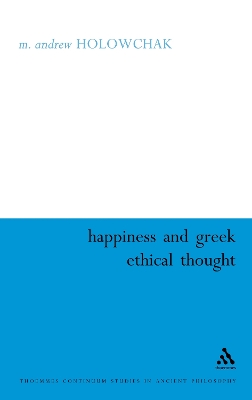Continuum Studies in Ancient Philosophy
1 total work
This book presents a fresh exploration of happiness through the ideas of the ancient Greek philosophers. It introduces readers to the main currents of Greek ethical thought (Socratic living, Platonism, Aristotelianism, Epicureanism, Scepticism, Stoicism, Cynicism) and takes a close look at characters such as Socrates, Diogenes and Alexander the Great. Yet Happiness and Greek Ethical Thought is much more than just a casual stroll through ancient thinking. It attempts to show how certain common themes in Greek thought (the role of reason as a guide for all actions, regard for virtue as a type of internal stability of character, recognition that ethics is not just a public but also a personal affair, etc.) are essential for living a happy life in any age. The author stresses that the Greek ethical ideal was principally integrative and suggests that the right conception of happiness involves integration at three different, but nested levels: personal, socio-political, and cosmic.
He argues that, in many respects, the Greek integrative ideal, contrary to the hedonistic individualism that many pluralistic societies today at least implicitly advocate, is a much richer alternative that warrants honest reconsideration today.
He argues that, in many respects, the Greek integrative ideal, contrary to the hedonistic individualism that many pluralistic societies today at least implicitly advocate, is a much richer alternative that warrants honest reconsideration today.
